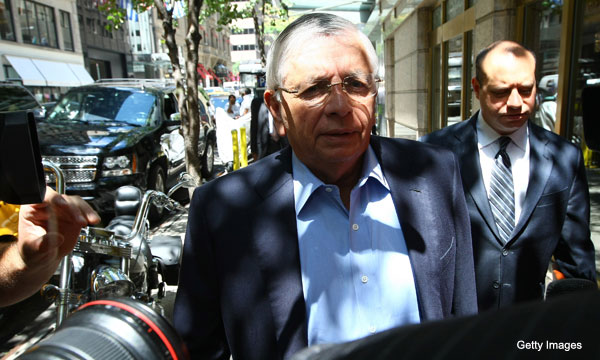
The NFL lockout has ended, with the league's owners and players agreeing to a new collective bargaining agreement just a scant few weeks left in the offseason. Free agency and other personnel moves will be rushed, but the NFL will play all of its games on time. And both sides seem happy with their particular take of the billion-buck pie. The NBA, coming off a year of record revenues and sky-high TV ratings, would seem to be next in line, right?
It would seem to be, but it won't be, unless there is a significant change of mood from either side in this situation. And because the two sides haven't had a significant conversation in about a month -- even the last negotiating sessions toward the end of June mainly just served as treading-water sessions -- they won't have nearly the same style and familiarity as the NFL sides had heading into the meat and potatoes of their final bargaining sessions.
Sure, the NFL had a 14-week head start on the NBA, but that matters little when both ends of the NBA table are acting as churlish as they are, with so many factions within those two opposing sides threatening to take away from the main thrust of either the players' or owners' arguments.
No, the NBA is far away from getting it together, even if the owners and players are just a week or so away from getting together to talk about getting together (after only a month off, those devoted caretakers of the game).
The recent move within the Players Associations' ranks to potentially decertify complicates things. The antitrust suit the players would then file would potentially take months to go through the court system, with little to show for at the end save for another flexing of muscle by the small cadre of agents who represent a disproportionate amount of players and, more importantly, salary. And, most importantly, salary potentially lost either in the form of current deals that the owners are refusing to pay (even though they, y'know, signed them) or new deals to be negotiated in the offseason.
And even if the players stick together, and meet with the league as a union, the union still has more than a few steps to go as it walks toward the middle. The owners signed these players to a litany of moronic contracts, there can be no doubt, and a goodly chunk of them were negotiated with no clear No. 2 option for these players in mind. It wasn't always Team A vs. Team B, driving up Lucky Player A's eventual salary. And even when it was two squads going at it -- for, say, Hedo Turkoglu -- that doesn't make it any better, guys.
The players have to give in, though. The system is skewed in their favor, even if the percentage of revenue that they receive was argued and signed to in good faith by the owners back in 2005.
The biggest issue, as it has been since 2005 and for some years before it, are the owners. They're easy to pick on, because there are only 30 to deal with here, but they're going to be the reason the NBA likely loses games this year.
The factions are just too far apart -- and we're not talking about the players and owners. The owners alone have to come up with a better revenue-sharing system, and swallow the fact that certain small-market owners ignored the dozens of ways to� improve a team without spending like the New York Yankees.
You think the Los Angeles Lakers want to send a single penny to Phoenix's way after the Suns owner wildly overpaid for the team years ago, then spent the next six years either needlessly overpaying for middling talent or outright selling off draft picks to add to his bottom line? Why should the Lakers help fund the Suns' stubborn choice to hang onto Steve Nash instead of parlaying their best asset into something that can help them become a better (and, holy cow, cheaper) basketball team?
(As an aside, this is a sound take on the situation, as the Suns realize on average that teams that blow things up often take up to a decade to return to a point of prominence. But statistics also show that you have a slim chance of becoming a two-term president, a Supreme Court justice or a NASA engineer. If you're smart enough, you can pull it off.)
You think the Chicago Bulls want to help subsidize the Memphis Grizzlies, a team that has repeatedly made waves about moving into Chicago's suburbs to potentially compete against the Bulls? A team that has for years worked with a Chicago-level payroll, even while missing the playoffs? A team that refused to part with Pau Gasol for years to Chicago, only to sign off on sending him away for expiring contracts and Marc Gasol a year later?
You think the New York Knicks ? nah. Not much thinking there.
The point is that the owners need to get their own act together before they can come correct at the bargaining table, and with so many owners willing to sit out the season -- they don't have to pay the players, and they'll still likely get $900 million from the league's national television partners, so why not? -- this is a fractured group that doesn't know what it wants, it won't negotiate even if it did, and it's about to meet up with a group of players that likely don't want to budge an inch.
Marvelous.
I have a feeling that I might put together the first fantasy football team of my life sometime next month.
New York Jets New York Giants Vince Wilfork Washington Nationals Chicago Cubs
No comments:
Post a Comment